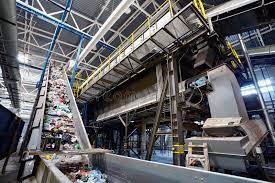
Recycling Plants
Recycling plants are advanced facilities dedicated to sustainable waste management. These innovative centers utilize state-of-the-art technologies to process and transform various waste streams into reusable materials. With comprehensive sorting systems, efficient shredders, and recycling units, they facilitate the recovery of metals, plastics, paper, and more. By minimizing landfill waste, recycling plants play a pivotal role in resource conservation and environmental protection. Through their commitment to circular economies, these plants contribute to a greener future by promoting responsible waste disposal and fostering the reuse of valuable materials, aligning with global efforts toward sustainability and reduced environmental impact.
Product Feature
Advanced Sorting Systems: Incorporate cutting-edge sorting technologies to efficiently separate diverse materials such as plastics, metals, paper, and glass for streamlined recycling processes.
Automated Material Handling: Utilize automated conveyor systems and robotic arms for the efficient movement of recyclables through different processing stages, minimizing manual labor.
Comprehensive Shredding Equipment: Employ powerful shredders capable of breaking down various materials into smaller, manageable sizes, facilitating easier recycling and material recovery.
Precise Screening Technology: Implement advanced screening systems for precise separation of materials based on size, ensuring high-quality output for recycling.
Metal Recovery Units: Feature specialized units for the recovery of ferrous and non-ferrous metals, contributing to resource conservation and reducing the need for raw materials.
Plastic Reprocessing Facilities: Integrate facilities for reprocessing plastics, transforming them into pellets or other forms suitable for manufacturing new plastic products.
Paper Pulp Production: Include facilities for paper pulp production from recycled paper, promoting sustainable practices and reducing the demand for virgin wood fibers.
Glass Crushing and Melting Units: Incorporate units for crushing and melting glass, enabling the recycling of glass containers into new glass products, conserving energy and raw materials.
E-Waste Processing Stations: Establish dedicated processing stations for electronic waste, ensuring the safe and environmentally responsible recycling of electronic components.
Energy Recovery Systems: Integrate systems for harnessing energy from waste materials, contributing to sustainable practices and reducing the environmental impact of waste disposal.
Product Application
Municipal Solid Waste Management: Address the challenges of mixed municipal solid waste by utilizing recycling plants to separate, process, and recycle various materials, minimizing landfill waste.
Single-Stream Recycling Facilities: Establish single-stream recycling facilities to simplify the collection and processing of mixed recyclables, encouraging greater participation and reducing contamination.
Plastic Recycling Centers: Contribute to plastic waste reduction by operating recycling plants dedicated to sorting, cleaning, and processing plastics for reuse in manufacturing.
Metal Recycling Operations: Implement specialized recycling plants for metals to recover and process ferrous and non-ferrous metals from end-of-life products and manufacturing scrap.
Paper and Cardboard Recycling Facilities: Promote sustainable forestry practices by establishing recycling plants that process paper and cardboard waste, contributing to the circular economy.
Glass Recycling Stations: Set up dedicated glass recycling stations to collect, sort, and process glass containers for remanufacturing, reducing the environmental impact of glass production.
Construction and Demolition Waste Recycling: Minimize the environmental impact of construction activities by operating recycling plants for construction and demolition waste, recovering valuable materials for reuse.
Electronic Waste Recycling Centers: Safely handle electronic waste by establishing recycling centers equipped to recover valuable metals and components, ensuring responsible disposal practices.
Textile Recycling Facilities: Contribute to sustainable fashion by operating recycling plants for textiles, repurposing used clothing and fabrics into new textile products.
Battery Recycling Stations: Address environmental concerns related to batteries by establishing recycling stations for the proper disposal and recovery of materials from used batteries.




